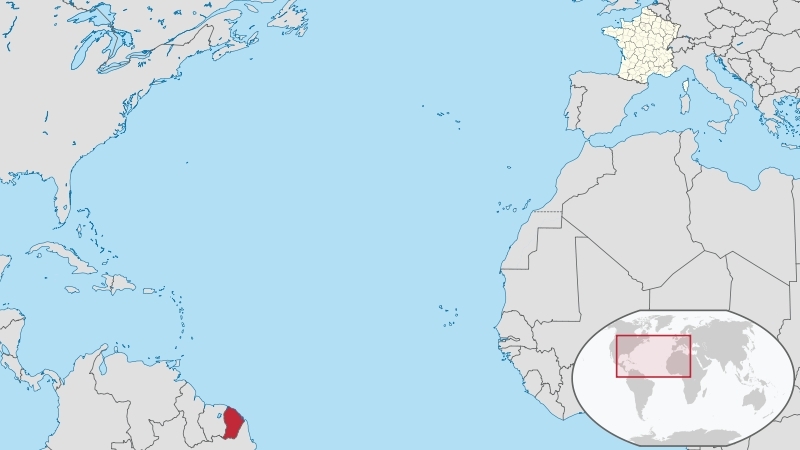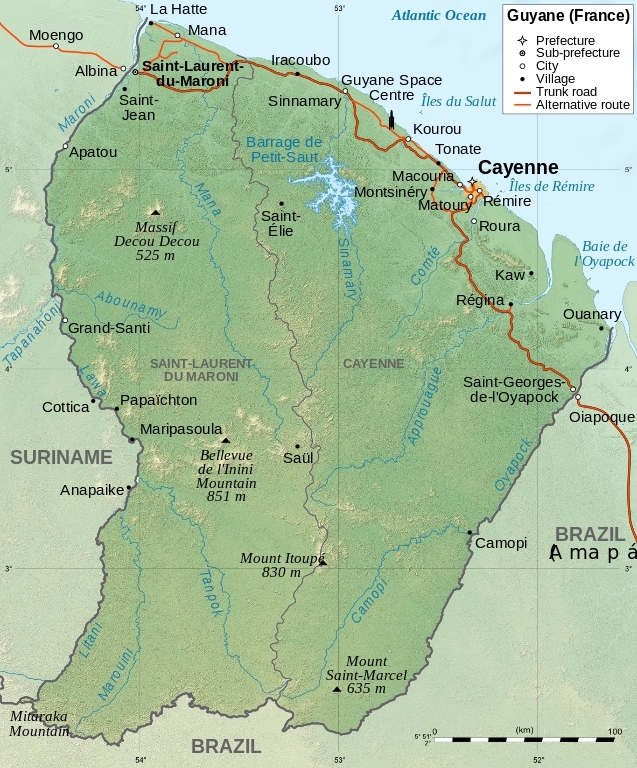French Guiana
Countries and Regions of the World Collection  French Guiana is a part of South America that is a "Department" (i.e. part of) of the nation of France and the only non-independent portion of the South American continent.
French Guiana is a part of South America that is a "Department" (i.e. part of) of the nation of France and the only non-independent portion of the South American continent.
It is located in the northern part of the continent between Suriname and Brazil.
Its northern coast fronts onto the Atlantic Ocean.
French Guiana is mostly an unsettled wilderness.
First settled by the French in 1604, French Guiana was the site of notorious penal settlements until 1951.
The European Space Agency launches its communication satellites from Kourou.
Contents
Geography
Location: Northern South America, bordering the North Atlantic Ocean, between Brazil and Suriname
Geographic Coordinates: 4 00 N, 53 00 W
Area: 91,000 km2 (89,150 km2 land and 1,850 km2 water)
- arable land: 0.14%
- permanent crops: 0.05%
- other: 99.81% (90% forest, 10% other) (2001)
Land Boundaries: 1,183 km (Brazil 673 km, Suriname 510 km)
Coastline: 378 km
Maritime Claims:
Territorial sea to 12 nautical miles
Exclusive economic zone to 200 nautical miles
Natural Hazards: High frequency of heavy showers and severe thunderstorms; flooding
Terrain: Low-lying coastal plains rising to hills and small mountains. The highest point is ellevue de l'Inini (851 metres)
Climate: Tropical; hot, humid; little seasonal temperature variation
Map of French Guiana. SourceL Wikimedia Commons.
Government
Government Type: Overseas department of France
Capital: Cayenne
Legal System: French legal system
People and Society
Population: 191,309 (July 2004 est.)
Age Structure:
Media age: 28.3 years
0-14 years: 29.6% (male 28,959; female 27,657)
15-64 years: 64.5% (male 66,388; female 57,020)
65 years and over: 5.9% (male 5,736; female 5,549) (2004 est.)
Population Growth Rate: 2.25% (2004 est.)
Birthrate: 21 births/1,000 population (2004 est.)
Death Rate: 4.82 deaths/1,000 population (2004 est.)
Net Migration Rate: 6.27 migrant(s)/1,000 population (2004 est.)
Life Expectancy at Birth: 76.89 years
Total Fertility Rate: 3.05 children born/woman (2004 est.)
Languages: French
Literacy: 83%
Protected Areas
See main article: Protected Areas of French Guiana
Agriculture
Agricultural products: corn, rice, manioc (tapioca), sugar, cocoa, vegetables, bananas; cattle, pigs, poultry
Irrigated Land: 20 sq km (1998 est.)
Resources
Natural Resources: Bauxite, timber, gold (widely scattered), petroleum, kaolin, fish, niobium, tantalum, clay
Economy
The economy is tied closely to the larger French economy through subsidies and imports. Besides the French space center at Kourou (which accounts for 25% of GDP), fishing and forestry are the most important economic activities. Forest and woodland cover 90% of the country. The large reserves of tropical hardwoods, not fully exploited, support an expanding sawmill industry that provides sawn logs for export. Cultivation of crops is limited to the coastal area, where the population is largely concentrated; rice and manioc are the major crops. French Guiana is heavily dependent on imports of food and energy. Unemployment is a serious problem, particularly among younger workers.
GDP: (Purchasing Power Parity): $1.551 billion (2003 est.)
GDP- per capita (PPP): $8,300 (2001 est.)
Industries: Construction, shrimp processing, forestry products, rum, gold mining
Currency: euro (EUR)


